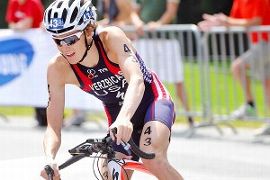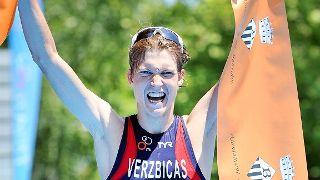Every Olympian has a unique journey made up of a combination of triumphs and challenges. Twenty-year-old triathlete Lukas Verzbicas hopes to one day earn the title of "Olympian" and, if he does, he too will have a colorful story to tell.
Verzbicas, who was born in Lithuania and immigrated to the United States with his parents when he was 9, has been in the spotlight since high school. In his junior and senior years, while Verzbicas was considered by many the best high school runner in the country, he balanced his talent with a passion for triathlon. Despite his status as one of the country's top young runners, Verzbicas logged a relatively low number of running miles.
"I think that triathlon was a form of cross-training that helped me become a great runner," Verzbicas says. "I was able to build a very large base off of the swimming and biking. When I was running I would pretty much just do speed work. It also prevented injuries because I wouldn't run long mileage. I got my base in the water and on the bike."
The formula of swim, bike and run propelled Verzbicas to two Foot Locker Cross Country championships (2009 and 2010), as well as victories at the Nike Cross Nationals Invitational (2010) and the Adidas High School Boys' Dream Mile (2010). He also won the 2009 ITU Junior World Duathlon Championship and finished fourth at the 2010 ITU Junior World Championship.
Though the balance worked well in high school, Verzbicas recognized that in order to become an elite athlete he would need to make a choice. With running and triathlon anxiously waiting for a decision, Verzbicas mulled his choices and admitted he was drawn by the mystique of the University of Oregon's track and field program.
"The University of Oregon is the mecca of the sport," Verzbicas says. "It has such a big story and it's every runner's dream. At the time I just wanted to be part of it. There is so much passion about running from the fans and the runners."
After signing a letter of intent to attend Oregon, Verzbicas, as well as the rest of junior triathlon community, was hit with shocking news. Kevin McDowell, a close friend of Verzbicas who trained with him in Chicago, was diagnosed with Hodgkin's lymphoma while he was preparing for the 2011 ITU Junior World Championship. Verzbicas temporarily shifted his focus back to multisport to fulfill his friend's goal of going for the win in Beijing.
"I thought the best way for him to feel like he was part of what he was supposed to be doing was for me to compete in honor of his name," Verzbicas says. "Next thing I knew I had won the race. It was a humbling experience to race for someone else. It was not what I expected when I committed to running in college. Everything changed after that."

Verzbicas followed through with his promise to attend Oregon, but it was not to last. On Nov. 10, 2011, less than a couple of months into the school year, Verzbicas announced that he would be leaving Oregon to pursue a full-time triathlon career.
"I was running for Oregon and I wasn't as successful," he says. "I didn't really fit in and it was just so different than what I expected. The passion of the school was there, but for myself, the training wasn't working. I was used to swimming and biking, and when that got taken away, it became worse. I knew I had a gift and I wanted to continue on and it wasn't happening for me without the swim and the bike."
Although he says he made the right decision for himself, he also recognizes that he could have handled it differently.
"Looking back on it now, it might have been a little immature being that I was just 18," he says. "I had all of these things going on and it was the best decision for my athletic career, but I understand that it may not have been the most moral thing."
With his short-lived collegiate career behind him, Verzbicas moved to Colorado Springs, Colo., to live and train near the U.S. Olympic Training Center. In January 2012 he traveled to La Paz, Argentina, to compete in the Pan American Championships. His first senior-level elite competition resulted in a DNF and he later said he had competed with an unspecified broken bone.
With his injury healed and a few more months of training under his belt, Verzbicas gave elite competition another shot at the Dallas ITU Pan American Cup last June -- and won. Verzbicas then headed to Spain to compete in the Banyoles ITU World Cup, where he once again got the win.
From there he headed to Kitzbuhel, Austria, to compete in his first ITU World Triathlon Series event against the best in the sport. He faced off with the likes of Alistair Brownlee, Jonathan Brownlee and Javier Gomez (who went on to be the three Olympic triathlon medalists in London) and he struggled, finishing 32nd. He also had a tough time at his second WTS race in Hamburg, where he ended up 52nd.
"I learned that experience is the most important thing at the elite level," Verzbicas says of the WTS races. "I was the youngest athlete there, and no matter how fast you are in the swim, bike and run, when it comes down to it, experience matters more. There are so many little things you can only learn in racing and how to execute at the elite level."
Last July, Verzbicas returned to the United States to apply those racing lessons to his training. July 31 turned out to be a life-altering day for the young athlete. While doing intervals on his bike in Colorado Springs, Verzbicas got caught up in wet sand on a descent heading into a turn and lost control of his bike.
He crashed into a barrier and was immediately taken to the hospital with severe injuries, including two broken thoracic vertebrae, a broken clavicle and a partially collapsed lung.
Verzbicas underwent several surgeries to insert two rods into his back and several screws in his clavicle. The ordeal became tense when he couldn't move his right leg after a back operation. He eventually regained movement in his leg, but doctors cautioned him that he may never walk -- let alone run -- again.
"At first I felt like I was being robbed of my gift and my talent," he says of his days in the hospital. "I really couldn't live without that in a way. It's my passion and it's all that really matters to me. I decided I would do everything in my power to get back to where I was. It was a scary time.
"I didn't let anybody else's influence get to me, unless it was a positive one. It's my life and I knew I had control. I took my recovery as training. Each step was a preparation for a race. I used what I learned in athletics as part of the recovery process."
Less than four months after the crash, Verzbicas defied everyone's expectations and returned to racing. He finished third at the 2.5-mile Orland Park Turkey Trot in Illinois on Thanksgiving Day. Less than two months later, he won the four-mile Ringling Bridge Run in Sarasota, Fla. It wasn't the elite competition Verzbicas is used to facing, but it was a sign of his determination and potential for a comeback.

"It was great to be racing," he says. "It wasn't a world championship or anything. It was just a local race, but to get that feeling back means a lot. For me it's the feeling of being grateful and knowing that I'm back."
Verzbicas will return to racing as an elite triathlete at March 8's ITU Pan American Cup in Clermont, Fla.
From there, Verzbicas will slowly work his way back into the rigorous ITU schedule. He plans to compete in April 20's ITU WTS San Diego race and then head to Europe for more ITU racing, but he cautions that everything is tentative and the big picture is what is important.
"Rio [site of the 2016 Olympics] is the No. 1 goal," he says. "This year is all about getting fully recovered. I'm not going to worry about performing this year. The Olympics are just under four years away, so there's still time. I need to make sure I'm ready for that."
Beyond making the Olympic team, Verzbicas acknowledges that his ultimate dream is to bring home a medal, something that has never been done by an American male in triathlon. But for now, the recently named USA Triathlon rookie of the year for 2012 is moving forward in his training and embracing the lessons of his life-changing bike crash.
"It's something you can't even compare to training," he says. "It's a different kind of hurt and uncertainty. Training is difficult, but it's not as hard as what I went through."

